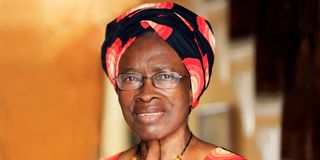Prof Were: Trailblazer and inspiration par excellence

2022 Nobel Peace Prize nominee, Prof Miriam Were.
What you need to know:
- Prof Were has spent several decades of her life promoting primary healthcare.
- Many lessons exist from the global icon for players in health and equality sectors to learn.
Along the corridors of the Kigali International Convection Centre, I meet with the 2022 Nobel Peace Prize nominee, Prof Miriam Were, on her way to a side session right from a plenary high-level discussion on the matter of community health during the Africa Health Agenda International Conference (AHAIC 2019).
I whisper a “Hello Prof” and she softly turns and responds, “Hi, young man. How are you?” The sort of elevator pitch quickly escalates to me, asking “What keeps you awake, even at your senior age?” She politely responds, while singling to allow her to proceed for the next session: “The desire to have everyone access quality health, regardless of their status.”
A humble and key champion for community health, Prof Were has spent several decades of her life promoting primary healthcare as an essential health approach based on practical, scientifically sound and socially acceptable methods and technology made universally accessible to individuals and families in the community through their full participation. Her efforts in strengthening health systems and interventions have earned her many global awards and recognition.
One of the consistent emphases of the nominee is having governments invest widely in community health as compared to just establishing state-of-the-art referral hospitals. Indeed, when you look at the service delivery triangle, the complexity of service being rendered increases the higher you go in the referral line.
However, the lower the facility, the higher the accessibility; hence the need to have community health settings that are fully responsive to the needs of the people. Simply put, having functional dispensaries can save more lives and prevent morbidities that a few major hospitals.
Many lessons exist from the global icon for players in health and equality sectors to learn. The professor dreams of an Africa in which every household has access to nearby community health services (CHS) facility that provides health-promoting, disease-preventing and first-line curative services.
She envisions an Africa where households are supported by empowered communities as they learn the art and science of parenting. In one of her sessions, she urges medical practitioners to utilise their knowledge in impacting communities.
She says: “At the end, it’s not the degree you have that matters but rather the impact you make in the community.” She discourages arrogance among educated people who behave as if they are superior beings, indicating that arrogance kills many things.
Players in the gender equality space have not been left behind. There are plenty of lessons to learn from Prof Were, as demonstrated through her work — including authored books and meaningful conversations. Prof Were a great champion for equality, discourages women from taking up the negative traits of men in the name of equality.
Mr Fatinato is the youth coordinator at Centre for the Study of Adolescence. [email protected]





